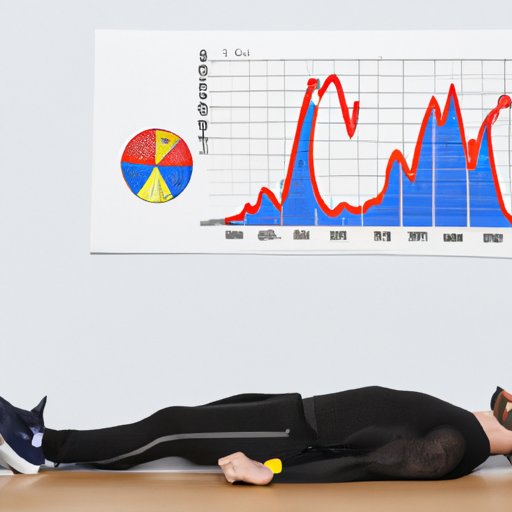Introduction
Regular exercise is a great way to stay healthy and fit, but it’s important to be aware of the potential risks of over-exercising. Overtraining occurs when an individual exercises too much, too often, or too intensely without allowing enough rest and recovery time between workouts. In this article, we’ll explore the signs, symptoms, benefits, and risks associated with working out too much.
Exploring the Signs and Symptoms of Overtraining
When an individual is overtraining, their body may not have enough time to recover from the previous workout before they start the next one. This can lead to physical, mental, and emotional fatigue. Common signs and symptoms of overtraining include:
Mental Fatigue
Excessive exercise can lead to mental exhaustion and difficulty concentrating. According to a study published in Frontiers in Physiology, overtraining can cause “decreased cognitive performance, decreased motivation to exercise, impaired sleep quality, mood disturbances, and increased perceived stress.”
Physical Symptoms
Overtraining can also lead to physical symptoms such as muscle soreness, joint pain, decreased appetite, and weight loss. Additionally, individuals who overtrain may experience frequent injuries due to their weakened muscles and joints.
Impaired Performance
When an individual is overtraining, their performance will suffer. They may find that they are unable to lift as much weight or run as fast as they did before. Additionally, they may experience a decrease in endurance, strength, and power.

Examining the Benefits and Risks of Working Out Too Much
While there are benefits to exercising regularly, there are also risks associated with over-exercising. Let’s take a look at both the benefits and risks of working out too much.
Benefits of Working Out
Regular exercise has numerous health benefits, including improved cardiovascular health, improved mental health, better sleep, and increased energy. Additionally, regular exercise can help individuals manage their weight and reduce their risk of developing certain diseases.
Risks of Over-Exercising
However, if an individual exercises too much, they may put themselves at risk of overtraining. When an individual overtrains, they may become fatigued, irritable, and prone to injuries. Additionally, they may experience a decrease in performance and an increase in stress levels.

Understanding How to Balance Workouts and Rest Days
It is important to maintain a balance between exercise and rest days. Properly scheduling workouts and taking adequate rest and recovery days can help individuals avoid overtraining and stay healthy.
Properly Scheduling Workouts
When it comes to exercise, more isn’t always better. Individuals should aim to spread out their workouts throughout the week and take at least one or two days off per week for rest and recovery. Additionally, individuals should focus on quality rather than quantity. Taking shorter, high-intensity workouts can be just as beneficial as longer, low-intensity workouts.
Adequate Rest and Recovery
Rest and recovery days are essential for giving the body time to recover from exercise. During these days, individuals should focus on getting plenty of sleep and eating nutritious foods. Additionally, individuals may want to consider incorporating light activities such as walking, yoga, or stretching into their rest days.

Analyzing the Impact of Working Out Too Much on Performance
When an individual works out too much, their performance will suffer. This is because their body does not have enough time to adapt to the increased workload. Without proper adaptation, an individual’s performance will plateau or even decline.
The Need for Adaptation
The body needs time to adjust to the increased demands placed on it by exercise. According to a study published in the International Journal of Sports Physiology and Performance, “If an athlete fails to allow sufficient time for the body to adapt to the training stimulus, the result may be an overreaching state, or even worse, an overtraining state.”
The Negative Effects of Overdoing It
If an individual continues to overtrain, their performance will eventually suffer. They may find that they are unable to lift as much weight or run as fast as they did before. Additionally, they may experience a decrease in endurance, strength, and power.
Investigating the Role of Nutrition in Avoiding Overtraining
In addition to properly scheduling workouts and taking adequate rest and recovery days, nutrition is key to avoiding overtraining. Eating the right foods can provide the body with the fuel it needs to handle the demands of exercise.
Nutritional Requirements for Exercise
When it comes to nutrition, individuals should focus on eating a balanced diet that includes lean proteins, complex carbohydrates, and healthy fats. Additionally, they should make sure they are getting enough vitamins and minerals to support their workouts. Lastly, individuals should make sure they are drinking plenty of water to stay hydrated.
The Role of Supplements
In some cases, individuals may need to supplement their diet with vitamins, minerals, and other nutrients. However, it is important to talk to a doctor or nutritionist before taking any supplements.
Conclusion
In conclusion, regular exercise is a great way to stay healthy and fit, but it’s important to be aware of the potential risks of over-exercising. Overtraining can lead to physical, mental, and emotional fatigue, as well as impaired performance. To avoid overtraining, individuals should focus on properly scheduling workouts, taking adequate rest and recovery days, and eating a nutritious diet. By following these tips, individuals can stay healthy and perform their best.
(Note: Is this article not meeting your expectations? Do you have knowledge or insights to share? Unlock new opportunities and expand your reach by joining our authors team. Click Registration to join us and share your expertise with our readers.)
